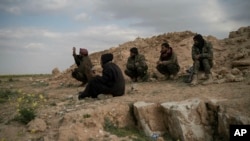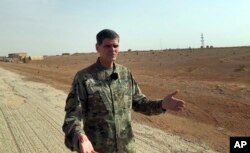Fighters and families with the Islamic State terror group are clinging to one last sliver of land next to the Euphrates River in Syria, using women, children and possible hostages as human shields in an effort to postpone defeat.
Human rights observers and officials with the U.S.-backed Syrian Democratic Forces say IS followers have been pushed out of the eastern Syrian village of Baghuz and taken refuge in what they describe as a collection of tents. Various officials have described the size of the camps as covering less than one square kilometer.
But efforts by the SDF to deal a final defeat to the terror group's self-declared caliphate have been slowed due to the presence of the civilians, and efforts to negotiate a surrender have also gone nowhere.
Speaking at the White House on Friday, U.S. President Donald Trump said, "We have a lot of great announcements having to do with Syria and our success with the eradication of the caliphate and that'll be announced over the next 24 hours and many other things."
In Munich, the top U.S. defense official offered a cautious assessment.
"We have eliminated the group's hold on over 99 percent of the territory it once claimed as part of its so-called caliphate," acting Defense Secretary Pat Shanahan said during a Friday news conference with his German counterpart at the Munich Security Conference.
"We have ensured ISIS no longer holds the innocent people of Syria or Iraq in their murderous, iron fist," he said, using an acronym for the terror group. "We have destroyed its ability to mass forces, and we have eliminated most of its leadership and significantly diminished its resources."
'Despicable and ghastly acts'
Coalition officials Thursday described SDF efforts in and around Baghuz as "clearance operations," warning that IS fighters had become so desperate that they were shooting at their wives and children as they sought to flee.
"These utterly despicable and ghastly acts further illustrate their barbaric nature and desperation," Operation Inherent Resolve Deputy Commander, British Maj. Gen. Christopher Ghika, said in a statement.
"The end of the physical caliphate is at hand," he added.
Some IS followers appear to have given up.
Monitors with the British-based Syrian Observatory for Human Rights said about 240 IS fighters surrendered this past week. The U.S.-led coalition and an SDF commander contacted by VOA could not confirm the claim.
They said the SDF also evacuated about 700 people, mostly women and children, from the terror group's refuge outside Baghuz on Thursday, taking them by cars and trucks to secured areas away from the front.
The SDF itself says over the past several weeks, tens of thousands of civilians have fled from IS.
But they say about 300 hardened IS fighters, many of them foreign, still remain, willing to fight to the death. And some SDF commanders say more civilians are being brought to the tent city, apparently from underground tunnels.
Observers late Thursday reported a resumption of shelling by the SDF and coalition forces, saying it appeared to be another attempt to convince the remaining IS holdouts to give up.
IS threat to remain
Still, even once the last pocket of IS-held territory is taken, U.S. and coalition officials warn the fight will not be over.
Top U.S. military officials have warned the terror group still has 20,000 to 30,000 followers, including fighters, spread across Syria and Iraq. And they worry about the ability of their Syrian partners, in particular, to keep IS in check once U.S. troops withdraw under plans announced by Trump.
The commander of all U.S. forces in the Middle East, Central Command Commander Gen. Joseph Votel, told CNN on Friday he disagreed with Trump's decision to call for U.S. forces to leave.
"It would not have been my military advice at that particular time. ... I would not have made that suggestion, frankly," he said. "[The caliphate] still has leaders, still has fighters, it still has facilitators, it still has resources, so our continued military pressure is necessary to continue to go after that network."
In the meantime, U.S. officials have been talking with other members of the coalition about increasing their help as U.S. troops prepare to leave. But so far, other coalition members, many of whom have no troops on the ground in Syria, have been unwilling to make any specific commitments.
"I think there's a tremendous desire to have a security arrangement or mechanism that doesn't result in a security vacuum. What that is … is still being developed," a senior defense official said Friday on the sidelines of the Munich Security Conference.
"We've been pretty clear that this is going to be a deliberate withdrawal," the official added. "There's a timeline associated with that that's conditions-based. We've said publicly on a number of occasions that it will be here in months, not weeks and not years."








